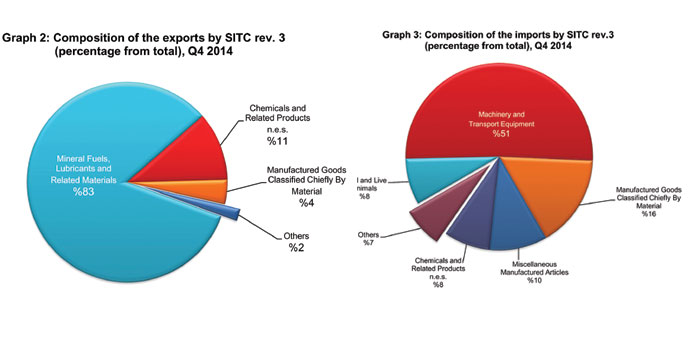
403
Sorry!!
Error! We're sorry, but the page you were looking for doesn't exist.
Qatar's trade surplus totals QR73.5bn in Q4, 2014: MDPS
(MENAFN- Gulf Times) Qatar continues to generate trade surplus, which totalled QR73.5bn in Q4, 2014, although imports have risen and exports fallen, the quarterly bulletin issued by the Ministry of Development Planning & Statistics shows (MDPS).
The foreign merchandise trade figures released by MDPS yesterday showed that Qatar's trade surplus dropped last year from QR94.7bn in Q4, 2013.
The value of Qatar's total exports (including exports of domestic goods and re-exports) amounted to QR104.2bn in end-2014, down 13.8% on QR121bn registered in the fourth quarter of 2013.
According to the MDPS, the year-on-year decline in total exports was mainly due to lower exports of mineral fuel, lubricants and related materials. However, it said increase in exports was seen in chemical and related products (by QR900mn) and manufactured goods (QR400mn).
The value of Qatar's imports, the MDPS said, stood at QR30.7bn in end-2014, up QR4.4bn (16.9%) on the same period in 2013.
The year-on-year increase reflects higher imports of machinery and transport equipment by QR2.3bn. Among the major import items were manufactured goods (up by QR1bn) and food and animal stock (up by QR400mn).
In the last quarter of 2014, Asia remained the "principal destination" of Qatar's exports and the "first origin" of Qatar's imports, representing 78.3% and 35.9% respectively, followed by the European Union, accounting for 10% and 26.9% respectively, and the Gulf Co-operation Council, with 6.7% and 14.7% respectively.
Releasing the data, HE the Minister of Development Planning & Statistics Dr Saleh Mohamed Salem al-Nabit emphasised the importance of providing accurate statistics on foreign merchandise trade in a "timely" manner, and said these represented "one of the main sources of information on the pattern and path of economic activity in the state."
Dr al-Nabit said merchandise trade data was a "major input" for the compilation of balance of payment and national accounts and an "essential piece of information" to private sector decision makers, as well as the government.
"In addition to supporting fiscal and monetary policy decisions, governments use foreign trade data to support the negotiation of international trade agreements," the minister noted.
The foreign merchandise trade figures released by MDPS yesterday showed that Qatar's trade surplus dropped last year from QR94.7bn in Q4, 2013.
The value of Qatar's total exports (including exports of domestic goods and re-exports) amounted to QR104.2bn in end-2014, down 13.8% on QR121bn registered in the fourth quarter of 2013.
According to the MDPS, the year-on-year decline in total exports was mainly due to lower exports of mineral fuel, lubricants and related materials. However, it said increase in exports was seen in chemical and related products (by QR900mn) and manufactured goods (QR400mn).
The value of Qatar's imports, the MDPS said, stood at QR30.7bn in end-2014, up QR4.4bn (16.9%) on the same period in 2013.
The year-on-year increase reflects higher imports of machinery and transport equipment by QR2.3bn. Among the major import items were manufactured goods (up by QR1bn) and food and animal stock (up by QR400mn).
In the last quarter of 2014, Asia remained the "principal destination" of Qatar's exports and the "first origin" of Qatar's imports, representing 78.3% and 35.9% respectively, followed by the European Union, accounting for 10% and 26.9% respectively, and the Gulf Co-operation Council, with 6.7% and 14.7% respectively.
Releasing the data, HE the Minister of Development Planning & Statistics Dr Saleh Mohamed Salem al-Nabit emphasised the importance of providing accurate statistics on foreign merchandise trade in a "timely" manner, and said these represented "one of the main sources of information on the pattern and path of economic activity in the state."
Dr al-Nabit said merchandise trade data was a "major input" for the compilation of balance of payment and national accounts and an "essential piece of information" to private sector decision makers, as well as the government.
"In addition to supporting fiscal and monetary policy decisions, governments use foreign trade data to support the negotiation of international trade agreements," the minister noted.

Legal Disclaimer:
MENAFN provides the
information “as is” without warranty of any kind. We do not accept
any responsibility or liability for the accuracy, content, images,
videos, licenses, completeness, legality, or reliability of the information
contained in this article. If you have any complaints or copyright
issues related to this article, kindly contact the provider above.

















Comments
No comment